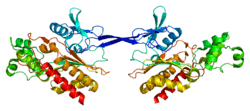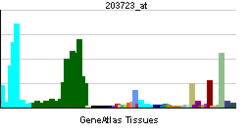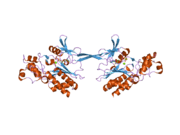ITPKB
| View/Edit Human | View/Edit Mouse |
Inositol-trisphosphate 3-kinase B is an enzyme that in humans is encoded by the ITPKB gene.[3][4]
Function
The protein encoded by this gene regulates inositol phosphate metabolism by phosphorylation of second messenger inositol 1,4,5-trisphosphate to Ins(1,3,4,5)P4. The activity of this encoded protein is responsible for regulating the levels of a large number of inositol polyphosphates that are important in cellular signaling. Both calcium/calmodulin and protein phosphorylation mechanisms control its activity.[5] Itpkb regulates immune cell function and is required for T and B cell development.[6]
References
- ↑ "Human PubMed Reference:".
- ↑ "Mouse PubMed Reference:".
- ↑ Takazawa K, Perret J, Dumont JE, Erneux C (Oct 1991). "Molecular cloning and expression of a new putative inositol 1,4,5-trisphosphate 3-kinase isoenzyme". Biochem J. 278 (3): 883–6. PMC 1151429
 . PMID 1654894.
. PMID 1654894. - ↑ Erneux C, Roeckel N, Takazawa K, Mailleux P, Vassart G, Mattei MG (Dec 1992). "Localization of the genes for human inositol 1,4,5-trisphosphate 3-kinase A (ITPKA) and B (ITPKB) to chromosome regions 15q14-q21 and 1q41-q43, respectively, by in situ hybridization". Genomics. 14 (2): 546–7. doi:10.1016/S0888-7543(05)80265-4. PMID 1330886.
- ↑ "Entrez Gene: ITPKB inositol 1,4,5-trisphosphate 3-kinase B".
- ↑ Sauer K, Cooke MP (April 2010). "Regulation of immune cell development through soluble inositol-1,3,4,5-tetrakisphosphate". Nat. Rev. Immunol. 10 (4): 257–71. doi:10.1038/nri2745. PMC 2922113
 . PMID 20336153.
. PMID 20336153.
Further reading
- Szlufcik K, Missiaen L, Parys JB, et al. (2006). "Uncoupled IP3 receptor can function as a Ca2+-leak channel: cell biological and pathological consequences.". Biol. Cell. 98 (1): 1–14. doi:10.1042/BC20050031. PMID 16354157.
This article is issued from Wikipedia - version of the 5/31/2016. The text is available under the Creative Commons Attribution/Share Alike but additional terms may apply for the media files.


